Nick's report is in but if you haven't got a spare 12 minutes to read it, 'asshole' would seem to sum up Tim Parker well enough.
Parker was right about one thing though; most of the shithouse was constructed between 2000 and 2010. The problem was the ones in charge. They were building a shithouse but pretended it was a chateau.
Post Office Chairman Tim Parker: Fatalistic Attraction
Nick Wallis
Thu 4 July 2024
16 comments
12 min read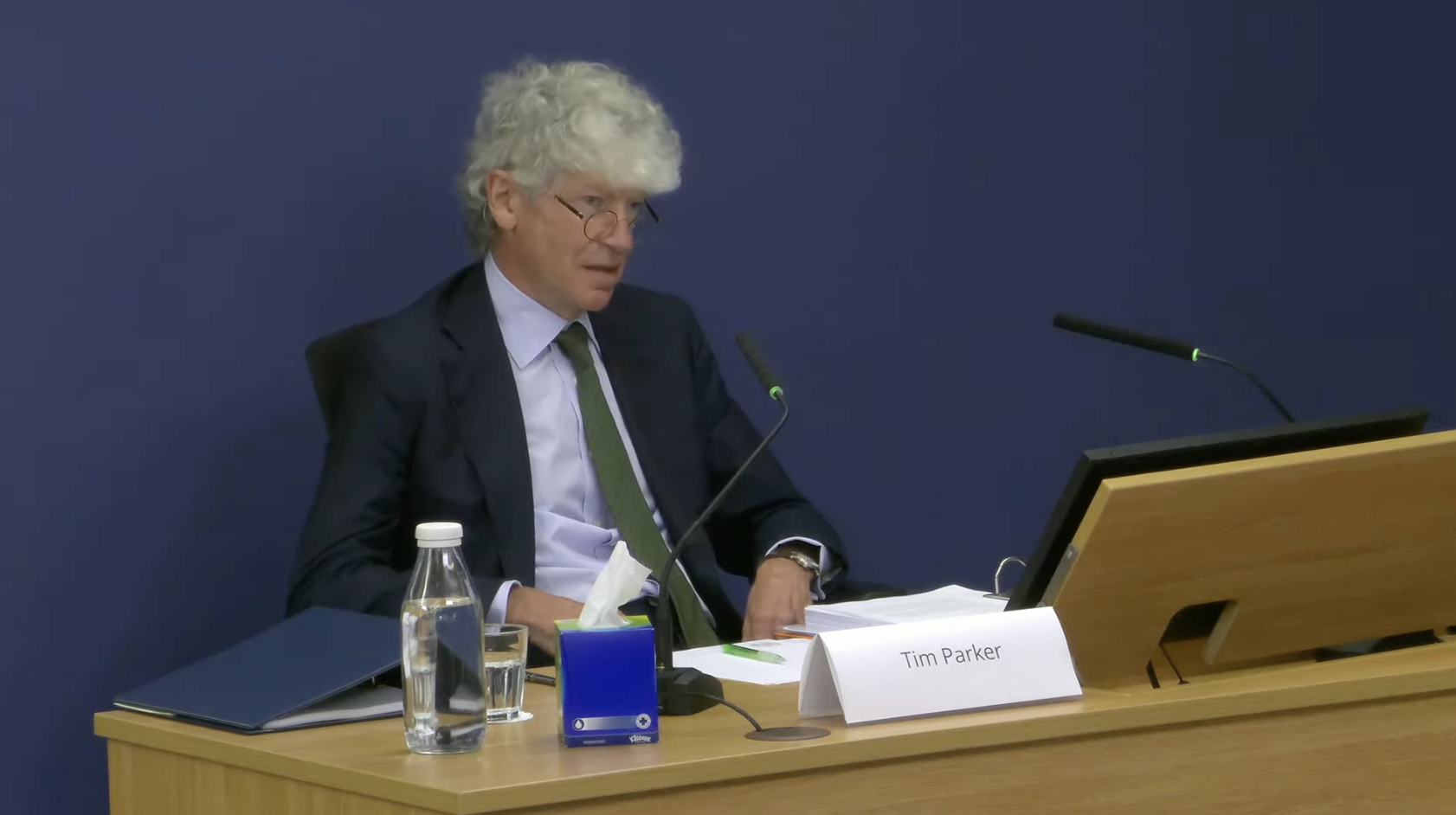
Tim Parker – Post Office Chairman 2015 – 2022
The morning started on a light note. After Tim Parker had been sworn in, Jason Beer KC, who was asking questions on behalf of the Inquiry, took him to paragraph 268 of his 136 page
witness statement.
Beer told the Inquiry that Parker had written about the Post Office appointing “a criminal with extensive experience to work alongside Brian Altman QC”. Beer wondered if perhaps the work “silk” was missing?
Parker agreed it was.
So, suggested Beer, “rather than the Post Office appointing a criminal, the Post Office would appoint a criminal silk?”
“Correct”, said Parker.
Glad that was tidied up.
Parker’s motivations for taking the job of Post Office chair were not properly explored. He told the inquiry he knew he was walking into a business “in deep crisis” and he showed some caution before agreeing to do so – requesting a good look at the Post Office’s figures. But Parker never took a salary (or, more accurately, he
donated his salary to charity) which begs the question – why would a busy, important, incredibly rich man without a knighthood agree to take on this government-owned basket case for no money?
Parker’s due diligence only went so far. He had no idea his predecessor, Alice Perkins (
and the business department
and the Post Office board) thought
Paula Vennells was a bit useless. In terms of his handover with Perkins, he told the Inquiry “I met Alice for lunch before I began.”
Parker has no recollection of any formal handover. Just a lunch.
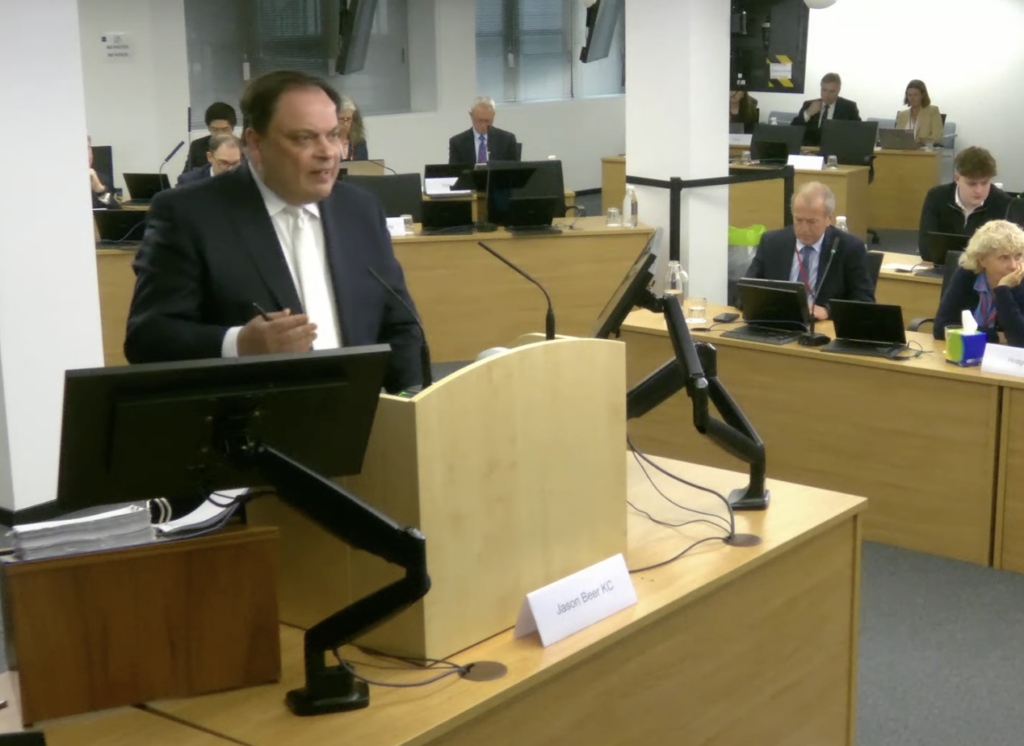
Jason Beer KC
Grooming the new chair
We were then taken to the briefing given to Parker on his arrival at the Post Office. It was drafted by Mark Davies, the Post Office’s director of communications. The initial draft of the document aimed to tell Parker that:
“thorough investigation has underlined that the [Horizon] system is efficient and robust.”
“We have also asked our external criminal lawyers to review all the cases involving prosecutions.”
“Throughout all this no evidence has emerged to support the very serious allegations being made”
“we only prosecute where there is clear evidence of wrongdoing… We do not prosecute people for making mistakes.”
“Some… complainants have now asked the Criminal Cases Review Commission to examine their cases… we are co-operating fully with this process and providing all information.”
“No information at all has been destroyed, as has been alleged.”
All of the above statements are untrue:
- there had not been a thorough investigation of the Horizon system,
- the criminal lawyers had not reviewed all prosecutions,
- independent investigators Second Sight and Detica NetReveal and Deloitte had all found evidence supporting the serious allegations being made by the JFSA,
- the Post Office was not co-operating fully with the CCRC and had not provided all information (eg the Clarke Advice),
- information had been destroyed (a point we were told was picked up by Andy Parsons from WBD before the document went to Parker)
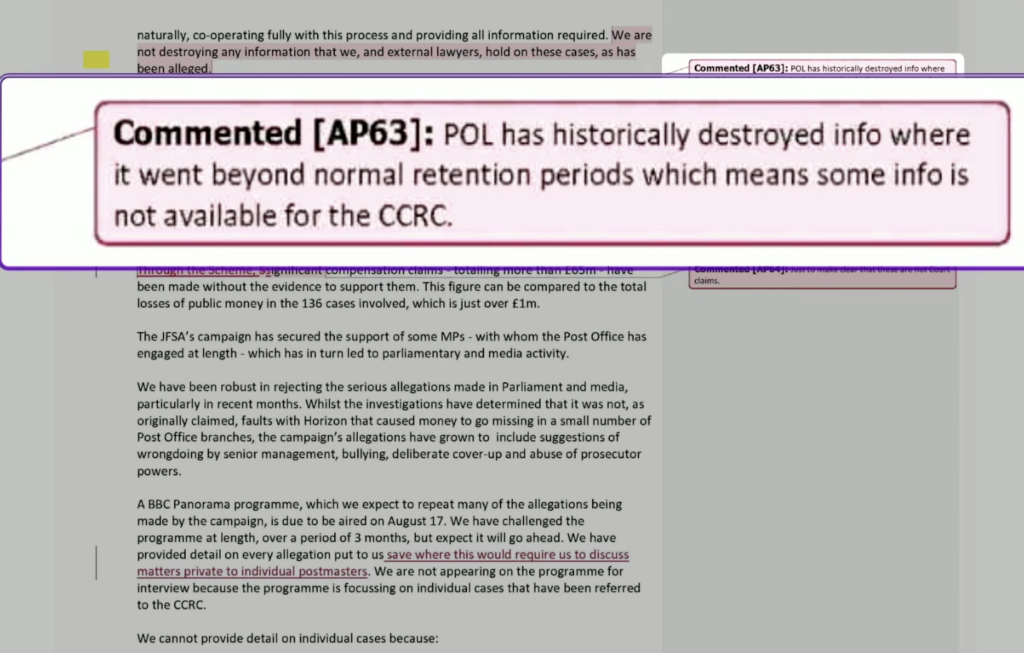
Andy Parsons’ comment on Mark Davies’ document
The briefing was eventually sent to Parker by his chief executive Paula Vennells, who claimed to be its author.
Tim Parker’s defence of his failings as Post Office Chair can be summarised this:
- it was a complex business with a lot going on. Potential miscarriages was only a part of what heI had to deal with, and,
- had he known how many prosecutions and sackings there had been at the start, his response could have been different
- resolving the intractable issues raised by Subpostmasters could only be done in a court of law – Bates v Post Office was therefore a benevolent happenstance
- it was all Jane MacLeod’s fault
Quite Strong Language
Parker’s plans for helping Paula Vennells make the Post Office more commercially-minded were derailed by a letter he received from the Business Department shortly after he was appointed. Parker was told by Baroness Neville-Rolfe, the Post Office minister, that he needed to investigate the Horizon system and see whether or not there had been any miscarriages of justice. Neville-Rolfe told him:
“I am… requesting that, on assuming your role as Chair, you give this matter your earliest attention and, if you determine that any further action is necessary, will take steps to ensure that happens.”
Within a week of getting his feet under the desk, Parker appointed Jonathan Swift QC to write a report. You can
read the Swift Review here. It’s not great, but it does suggest a lot of things at the Post Office have gone seriously wrong. Professor Richard Moorhead has written ten blog posts about its failings (
start here). Parker, increasingly coming across as a semi-detached chair called the Swift Review “relatively reassuring”, telling the Inquiry: “it wasn’t a bad piece of work and it yielded some good recommendations”.
In his report Swift raises an essential point about the Post Office’s bait and switch prosecution tactic – going after Subpostmasters with unevidenced theft charges in order to secure a guilty plea of false accounting. As Swift has it, the Post Office
“effectively bullied Subpostmasters into pleading guilty to offences by unjustifiably overloading the charge sheet”. Swift was unequivocal that this was
“a stain on the character of the business.”Beer said: “That’s quite strong language, isn’t it?”
“Quite strong, yeah”, replied Parker.
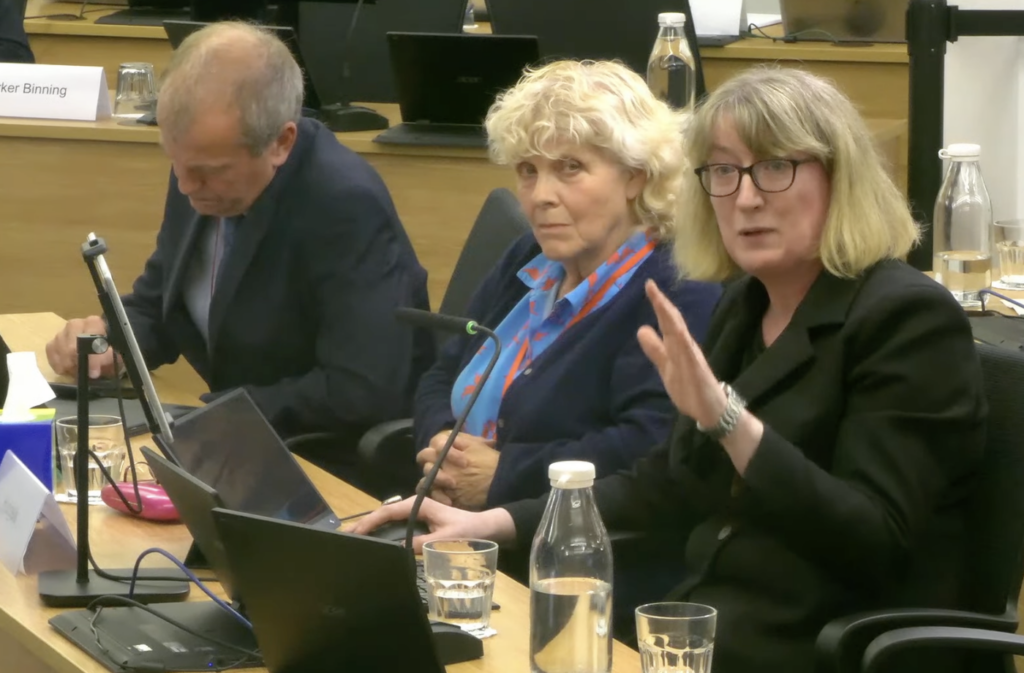
Jo Hamilton (centre) and her legal team
Secret Swift
Parker chose not to share the Swift Review with the Post Office board. He says this was because he was told not to by Jane MacLeod, the Post Office’s general counsel (the title given to a company’s top in-house lawyer). This apparently came down to Parker’s failure to understand
privilege. Parker says he couldn’t do anything with the document because it was privileged.
Beer took him to this, noting “the report on its face is not marked as privileged is it??
“No, no”, said Parker.
“And the report does not say that it’s been provided for the purpose of… any ongoing litigation?”
“It doesn’t”, agreed Parker.
“It doesn’t say that it was provided for the purposes of obtaining legal advice, does it?” asked Beer.
“No”, said Parker, who (like most of us) had no idea what privilege is and the forms it can take.
It turns out Parker didn’t even give the Swift Review to Baroness Neville-Rolfe, his boss and the person who commissioned it. For this and his failure to give the report to the Post Office board, he was later censured by Sarah Munby, a senior official in the Business department. Parker said he was just following McLeod’s legal advice.
When it came to the group litigation Parker also followed legal advice. He suggested that
Bates v Post Office was not a failure, but somehow a natural consequence of the intractable problems the Post Office was faced with. Or as Parker said today: “it remains my view to today that once the litigation had started, and although I think we’ll see it wasn’t necessarily handled in the best and cooperative manner, the litigation… ultimately proved to be a comprehensive… settlement of a lot of very complex issues.”
Always the lawyers
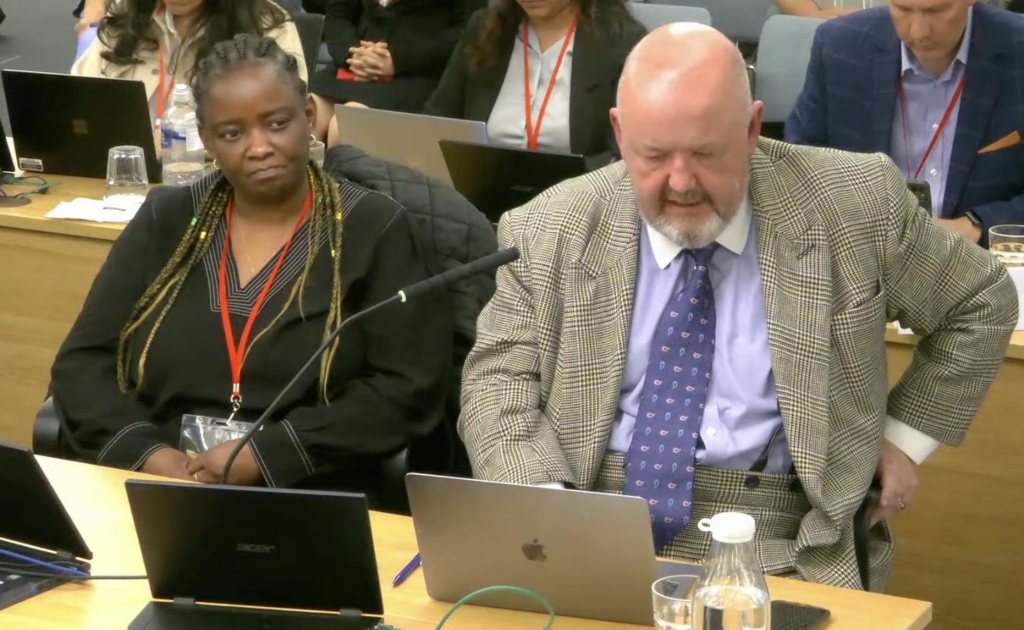
Teju Adedayo and her barrister Ed Henry KC
Parker went on some after this, circling his point that essentially the courts were the best place to resolve the issues Alan Bates and the Justice for Subpostmasters Alliance had been raising. Beer waited until Parker had stopped speaking, then he asked: “Are you saying by that answer that it needed a group of brave and determined Subpostmasters to hold the Post Office to account by bringing in the Post Office before a court? And that the Post Office was incapable of doing it itself?”
It seems that was exactly what Parker was suggesting. He told Beer:
“with hindsight… the postmasters… Sir Alan Bates should never have been required to mount a group litigation order. I understand that… all I’m saying is that once it was in train, had it been managed a bit better, then a lot of complex issues might have been determined without the delay and without the cost. But a judge review of all these issues, I still think, one way or another, was the right way to get, you know, an outcome in the end, yes.”
Towards the end of the day, by Ed Henry KC asked whether he was being “fatalistic” about the scandal “and that more could have been done to strive to see the other side, and to strive for settlement without having to enter into the quagmire of litigation?”
Parker replied: “Yeah, I mean, there’s no satisfactory answer to this.”
Over the course of the day we were reminded that Tim Parker took on the job as Post Office chair by agreeing to give the company 1.5 days of his time a week. He then successfully managed to reduce that to 2 days a month. Just the man to run an organisation which he described in “deep crisis” at the time he joined, with “an awful lot going on… and an awful lot of stuff that needs addressing.” Challenged on this, Parker said:
“being a Chair is about a number of different things and it certainly is about time spent in a business but it’s also about the capacity to understand business problems and the capacity to strike up effective relationships with the key people in a business, especially the CEO…. what happened here was the result of me not spending enough time at the Post Office, and I would certainly rebut that suggestion. I would say that I was a very active, energetic chair who took a lot of time and spent time with people to understand the business.”
The only way that logic could makes sense was if Parker’s reign was an unqualified success. As it was, he took the business from crisis into catastrophic failure, to the point that were it any ordinary organisation, it would be dissolved.
Parker’s shoulder-shrugging about the inevitability of litigation might have held more weight were it not for the fact that once the judge (Mr Justice Fraser) had begun to find in favour of the Subpostmasters, the Post Office threw the kitchen sink at
trying to get him recused.
Parker says when Jane McLeod suggested the Post Office attempt a recusal application, he was “a little bit uneasy… it’s big deal to get a judge to accept that they had made a judgment that was wrong on technical grounds”. Nonetheless, the Post Office went to the finest lawyers money could buy – Lords Grabiner and Neuberger.
According to Parker, Grabiner “
said something along the lines that we had a duty almost to ask for the judge’s recusal….The way the advice was framed was that.. almost… the law required us, where we thought something had been incorrectly managed for whatever reason, we needed to act upon it.”
Grabiner’s claim that the Post Office had a “duty” to apply for recusal was described by Grabiner as nothing more than his
personal emphasis, nothing to do with a legal duty. Beer asked Parker: “Can you recall whether you formed a view as in what sense you were under a duty to make the application?”
Parker replied: “I don’t want to make too much of this duty thing. I think we just got advice from two very, very senior lawyers and felt on balance that advice should be taken.”
Swift exit
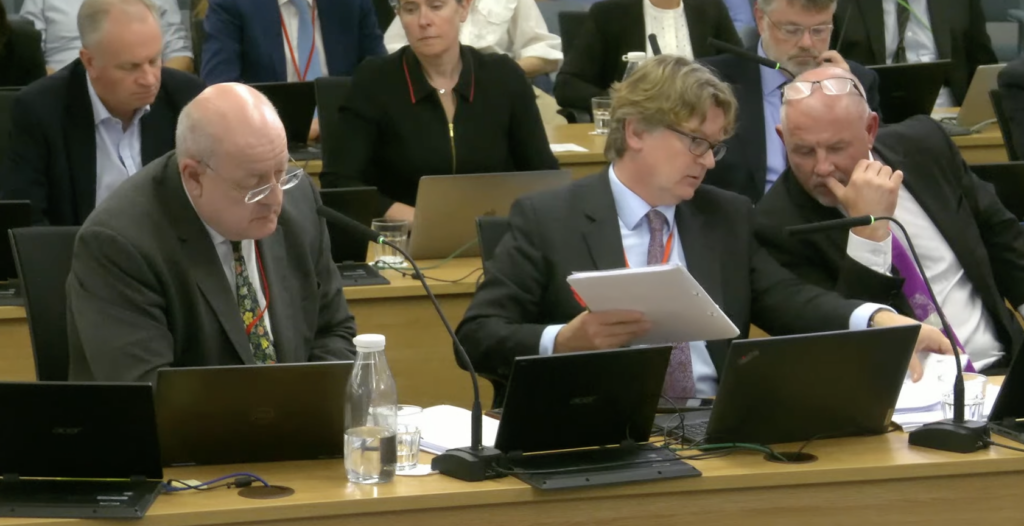
(l-r) Sam Stein KC, Chris Jacobs and David Enright
The Swift report seems to have been strangled at birth by Jane MacLeod. She allegedly told Parker he could not release it to the Post Office board and then connived to ensure that the minister, Baroness Neville Rolfe, never got to see a copy. In fact – it was such a sensitive document it wasn’t initially digitised. According to Parker, under McLeod’s instruction, the review was held in paper copy only by four people at the Post Office – MacLeod, Rodric Williams, Patrick Bourke and Mark Underwood.
Swift made eight recommendations including a proper review of the Horizon IT system. He also recommended every single Post Office prosecution should be investigated. Parker tasked MacLeod with implementing the Swift review. She, Williams and Bourke soon found an excuse to avoid doing so. When the Bates v Post Office litigation came around, Williams wrote of the need to create “a piece of advice that says TP [Tim Parker] should stop any further work”. Williams continued “I’m conscious that this feels somewhat unpleasant in that we are being asked to provide political cover for TP. However, putting aside the political background, shutting down TP’s review is, in my view, still the right thing to do.”
Patrick Bourke wrote: “the litigation makes the Review irrelevant since the issues to be considered will be put to a higher standard of testing in the Courts; to continue would be fruitless since we couldn’t use its output, senseless in terms of expenditure, and present unnecessary risk to the organisation’s legal position.”
Between them, they got their way. And what of Parker, the semi-absent, part-time chair?
“When you get to see these emails… which are what’s going on behind the scenes,” he said, “it kind of puts a different complexion on things”.
Jane MacLeod has
refused to be questioned by the Inquiry.
[*]
Facebook[*]
[*]
LinkedIn[*]
16 responses to “Post Office Chairman Tim Parker: Fatalistic Attraction”
[list=wp-block-comment-template][*]

Lizzie
July 4, 2024 at 10:13 amGood morning all.
I watched most of Parker’s performance open-mouthed yesterday. Yes, he did the right thing in commissioning the Swift Report, but for someone with his experience to be bowled out by serial liars is quite unbelievable. In danger of sounding like the boss in The Life And Death of Reggie Perrin – he didn’t get to where he was without knowing a shyster when he saw one.
This, more than anything, summed up the ingrained attitude of the GC and her sidekicks:
“I’m conscious that this feels somewhat unpleasant in that we are being asked to provide political cover for TP. However, putting aside the political background, shutting down TP’s review is, in my view, still the right thing to do.”
How was that ‘political cover’ for TP? It is highly likely it was political cover for Post Office apparatchiks – how so, you might ask? He’d been there five minutes, they’d had years to finagle, to cover their backsides, and here comes this candy-floss haired meddler with a massive spanner to gum up the works. No wonder Jane McLeod is refusing to speak to the Inquiry, by the sound of it she may be more concerned about accusations of perverting the course of justice.
What a shower.
Reply[*]

Tim Shapcott
July 4, 2024 at 10:08 amParker was there to get a gong only….
in fact out of his depth at this level and clearly inexperienced in applying judgment and qualifying advice in legal matters.
never understood the technical issues and didnt want to look either.
Basically a complete wet….and again delayed the truth…
Reply[*]

Elizabeth Moyse
July 4, 2024 at 10:04 amI was at the inquiry yesterday – this account summarizes it very well indeed. I felt it was unfortunate that Ed Henry left his question about Teju Adedayo until he was running out of time, particularly as she was sitting next to him…it enabled Parker to shrug it off. A propos of how little time Parker actually spent at the Post Office, it is rather odd that many of the emails from him we were shown came from his National Trust email – did he not have a Post Office one? And I would be very interested to know what he was paid for being Chair – he may have given it to charity – I bet it wasn’t one that would help wrongly convicted subpostmasters! The day before yesterday, I was at my local post office and asked the postmistress if they had been affected by the scandal. She told me that at one point they had had 5 or 6 heavies behind the counter going through stuff – but hadn’t complained because her husband preferred to put it behind them. I wonder how many more like them there are…
Reply[*]

G Kelly
July 4, 2024 at 9:37 amA strutting peacock who believes that the magnificence of his bonce is proof enough of his extraordinary abilities. He doubtless has never considered self reflection necessary but often indulges in his mirror reflection.
Reply[*]

Rosie Brocklehurst
July 4, 2024 at 9:34 amThere is an understandable tendency to think ‘conspiracy of knaves’ in this awful saga and maybe I am wrong. But in an article in 2022 in the Mail, they claim Parker donated his salary of £75000 for 1.5 days a week to charity ‘in recent years’. I am thinking he did not donate it until he needed to look good perhaps after his errors on the Swift review, but he stuck it out rather than resign to do sort out getting a new CEO in place . Nick Read was, unusually, at the Inquiry yesterday? Parkers’ salary reduced to £19,000 when he went down to half a day a week from 2020. As an aside, I thought only 8 cases were recommended for review in the Swift advice ..and the point was no question was asked by Parker as to how many there really were and that only came to the surface well after 2015. It seems extraordinary to me that this P/T chair never asked how many prosecutions there had been when real estimates of much larger figures -hundreds of cases, were being established by Nick in the Inside Out programmes and the Panorama in 2015, the very year Parker came in. Why did he want the job? This was a man who had a history of sacking thousands, of selling off companies he ‘turned around’ and making millions from these sales – (he had £75 million in 2008 and by 2018 recorded as having £273 million by the Times Rich List built up between 2008 and 2015). He had flirted with Boris Johnson and London politics, becoming Boris’s Deputy London Mayor in 2008 but called himself a socialist turned Capitalist. He certainly had no grip on POL, obviously believes some SPMRs who have been acquitted are guilty but won’t say so, and curves round the question of why appalling people like Rodric Williams are still at POL – on the grounds that you wouldn’t be able to do anything if you got rid of people.
Reply[*]

Alan Cornforth
July 4, 2024 at 9:22 amIt was about 20 minutes (or so) into Tim Parker’s evidence that I suddenly realised that he reminded me of the late great University Challenge presenter Bamber Gascoigne and then, within a minute of this revelation, I heard JB quote from an induction document for TP that started with “this should give him a starter for ten” !!
That was where the comparison ended, however, as he didn’t answer many questions!
Reply[*]

Big Chris
July 4, 2024 at 9:13 amMan in a Suitcase*
Back in the late 60’s this British TV series about McGill, an ex CIA man turned private detective, was very much about betrayal, mistrust and deceit. He travelled everywhere, hence man in a suitcase.
Tim Parker was the part time POL sleuth and Chair who held down so many roles that he must have found it difficult managing his smalls let alone his briefs. The man in a Samsonite suitcase.
The man who helped to end national trust in the Post Office brand. A man who hired expensive lawyers like Kwik-Fit fitters. By the end of his tenure, the Post Office vehicle he had been carelessly driving ended up being suitable only for sale by a dodgy second hand salesman. Ironic as by this time he tried to cut his work at POL down to a half a Daily.
Phew! Jobs, jobs, jobs! as my grandson said after receiving homework during his first week at school.
You can feel their pain.
Parker did have British Pathe news to run after all, plus the National Trust and Her Majesty’s Courts and Tribunals Service. The former Kenwood Chef man a blender of justice. Parker in his wide ranging roles always comfortable in his own shoes. A Superman once seen in Clarks, Kent.
Taking over at POL the man labelled the ‘Prince of Darkness’ when he cut 10,000 jobs at the AA thought he could help develop the commercial skills of the Rev Paula Vennells in cutting costs. The Prince of Darkness schooling the Daughter of Darkness in the dark arts?
Unfortunately our man in a Samsonite didn’t realise his super powers would be useless in an organisation full of kryptonite. Lurking in the underworld were corporate psychopaths, lawyers undergoing disclosure aversion therapy and the Horizon system, full of errors and so badly coded that even McGill’s CIA would struggle to decipher it.
Like our 1960’s hero McGill, Parker found himself in a situation full of unscrupulous characters prepared to use any means to achieve their ends.
But that is where the comparison ends. Parker was too smart and too detached to be the fall guy. The cynic may question his amnesia and by the end of the questioning you could see the mask of co-operation with the inquiry slipping.
Rather than appearing bored like Perkins, he appeared like a schoolchild just before the final bell goes. Wrapping up his lanyard and shutting his file while answering the last question. He oozed self satisfaction and lack of contrition or empathy.
Despite appearing surly and moody, McGill did feel compassion for those who were the victims in his cases, and would try to help them, often at his own cost.
On the other hand, Parker, the Prince of Darkness appeared content that the outcome of Bates v the Post Office had resolved the issues.
He had somehow helped to achieve that end result despite POL throwing £millions of taxpayers money at a rearguard action by the Kwik-Fit lawyers to thwart justice. Parker was the Kenwood chef blender of justice and the skint little people only narrowly missed being pulp in the POL fiction.
At the end of the inquiry, the former deputy major of London and CEO of the Greater London Council bid us farewell.
Whether the former Chairman of Transport for London used the tube or not I don’t know. The man in the suitcase with a degree in philosophy disappeared up his own logic. Puff! He was gone! The ultimate salesman who made it big. Like his former boss Boris Johnson only with better hair.
Listening to Parker reminded me of the words of another great salesman, Arthur Daley…
Have I not suffered enough? Have I not endured endless sleepless nights of concern? If you prick me, do I not spill claret?
* As Parker is a trustee of the Royal Academy of Music (jobs, jobs, jobs, phew!) he might be interested to know that the theme to Man in a Suitcase by John Barry was used by Chris Evans as the introductory music to TFI Friday.
This is not to be confused with Man in a Suitcase from the album Zenyatta Mondatta.
That is by the Police who are of course not to be confused with the Met Police who are investigating the scandal.
Let’s hope POL face the music.
Reply[*]

Dusty dog
July 4, 2024 at 8:59 amAnd the Devil casts his net.Yet again Roderick Williams and Jane McLeod have perverted the course of Justice. The Police and Solicitors Regulatory Authority need to thoroughly investigate the heinous part these two played in this catastrophe. Mr Henry KC was spot on when he said Williams was at the centre of the web!
Reply[*]

Shaun Taylor
July 4, 2024 at 8:40 amHe came across certainly as someone who would make a good Chairman for the National Trust which he was, but the Post Office? my god the other candidates can’t have been up to much.
Reply[*]

Helen Hatton
July 4, 2024 at 8:28 amMost of Tim Parker’s E mails in to Post Office shown by the enquiry were written from his other “ day job” positions . E mails were signed off from National Trust and Samsonite whenever he corresponded with staff at the post office. So although he was a part time ad hoc chairman of the post office, 2 days a month at one time ,he was working on other companies time when away from the post office. Surely not the “right” thing to be doing? Wonder what Samsonite and National Trust think to this behaviour.
Reply[*]

Mark O’meara
July 4, 2024 at 8:05 amTim Parker seems to have been a very part-time Chair of POL, having many other ‘top jobs’ at the same time. He tried to set his Horizon failures in the context of his having been inundated with many other POL challenges, to which Mr Beer pointed out that ‘context’ also included the fact that TP had asked for his hourly commitment per month to POL to be reduced. He didn’t like that.
He cast doubt on Jane McLeod’s claim (in her witness statement) that she had offered the Swift Report to any Board member ‘on request’. TP said that he could not recall her making this offer in any Board meeting. Is the Inquiry really unable to get JMcL to answer questions now? She could do so without leaving NZ, of course.
TP used a sloppy way of talking – with many instances of “kind of”, “yeah”, “you know”, “er”, “um” and “mmmm”. This, along with his evident desire to justify and excuse himself, meant that many of his answers to Mr Beer’s questions were rambling and very vague indeed. Perhaps that was the intention. Mr Beer picked him up on his use of language at one point, telling TP that ‘words are important’ (or a phrase along those lines).
Reply[*]

Bob Lawson
July 4, 2024 at 7:52 am“requesting a good at the Post Office’s figures.”
Perhaps “requesting a good (look?) at the Post Office’s figures.”
Very funny under the circumstances…
The inquiry consists of long periods of tedium interspersed with too few moments (such as that one) of levity… Which is understandable.
Reply
Nick Wallis
July 4, 2024 at 10:23 am
oops thanks – will fix
Reply
[*]

Sarah
July 4, 2024 at 7:31 amTP has hit the highest spot on my league table of evil Post Office creeps. He’d “toyed” with the idea of making an apology in his opening statement. He worked hard throughout the morning to make Jason Beer KC his ‘chum’. Every answer relating to the SPMs was evasive, cold-hearted, constantly minimising the living hell they endured, and continue to suffer as they listen to these ‘entitled’ business leaders (!) explain away their part in this scandal. TP lied and lied and lied …
Reply[*]

Graham Thorpe
July 4, 2024 at 7:28 amSo he’s yet another one who tries to get away with giving a sort of commentary on the events while acting as if he was not an important part of them himself. They’ve all done it in their turn.
Reply[*]

Patty Solomon
July 4, 2024 at 3:34 amStill don’t understand what “robust” is supposed to mean in the context of the Horizon system. The word is used repeatedly but it is not a term used in the context of computer systems or software or programming.
I am writing from Australia as a retired Professor of Statistics so please let me know if this has been covered already.
[/list]
 1 ... 12 ... 20, 21, 22
1 ... 12 ... 20, 21, 22 
 Re: The Post Office Scandal Mon Jul 01 2024, 13:18
Re: The Post Office Scandal Mon Jul 01 2024, 13:18
 Re: The Post Office Scandal Mon Jul 01 2024, 14:32
Re: The Post Office Scandal Mon Jul 01 2024, 14:32
 Re: The Post Office Scandal Mon Jul 01 2024, 20:41
Re: The Post Office Scandal Mon Jul 01 2024, 20:41
 Re: The Post Office Scandal Mon Jul 01 2024, 21:50
Re: The Post Office Scandal Mon Jul 01 2024, 21:50
 Re: The Post Office Scandal Tue Jul 02 2024, 13:55
Re: The Post Office Scandal Tue Jul 02 2024, 13:55
 Re: The Post Office Scandal Tue Jul 02 2024, 19:32
Re: The Post Office Scandal Tue Jul 02 2024, 19:32 Re: The Post Office Scandal Wed Jul 03 2024, 08:24
Re: The Post Office Scandal Wed Jul 03 2024, 08:24
 Re: The Post Office Scandal Wed Jul 03 2024, 08:56
Re: The Post Office Scandal Wed Jul 03 2024, 08:56 Re: The Post Office Scandal Wed Jul 03 2024, 09:23
Re: The Post Office Scandal Wed Jul 03 2024, 09:23
 Re: The Post Office Scandal Wed Jul 03 2024, 14:58
Re: The Post Office Scandal Wed Jul 03 2024, 14:58



 Re: The Post Office Scandal Thu Jul 04 2024, 08:20
Re: The Post Office Scandal Thu Jul 04 2024, 08:20
 Re: The Post Office Scandal Thu Jul 04 2024, 11:54
Re: The Post Office Scandal Thu Jul 04 2024, 11:54
 Tim Parker – Post Office Chairman 2015 – 2022
Tim Parker – Post Office Chairman 2015 – 2022 Jason Beer KC
Jason Beer KC Andy Parsons’ comment on Mark Davies’ document
Andy Parsons’ comment on Mark Davies’ document Jo Hamilton (centre) and her legal team
Jo Hamilton (centre) and her legal team Teju Adedayo and her barrister Ed Henry KC
Teju Adedayo and her barrister Ed Henry KC (l-r) Sam Stein KC, Chris Jacobs and David Enright
(l-r) Sam Stein KC, Chris Jacobs and David Enright Re: The Post Office Scandal Thu Jul 04 2024, 23:10
Re: The Post Office Scandal Thu Jul 04 2024, 23:10
 Re: The Post Office Scandal Fri Jul 05 2024, 01:52
Re: The Post Office Scandal Fri Jul 05 2024, 01:52
 Re: The Post Office Scandal Fri Jul 05 2024, 07:47
Re: The Post Office Scandal Fri Jul 05 2024, 07:47




 Re: The Post Office Scandal Fri Jul 05 2024, 15:04
Re: The Post Office Scandal Fri Jul 05 2024, 15:04
 Re: The Post Office Scandal Fri Jul 05 2024, 16:51
Re: The Post Office Scandal Fri Jul 05 2024, 16:51
 Re: The Post Office Scandal Fri Jul 05 2024, 22:54
Re: The Post Office Scandal Fri Jul 05 2024, 22:54 Re: The Post Office Scandal Fri Jul 05 2024, 23:00
Re: The Post Office Scandal Fri Jul 05 2024, 23:00 Re: The Post Office Scandal Sat Jul 06 2024, 08:14
Re: The Post Office Scandal Sat Jul 06 2024, 08:14
 1 ... 12 ... 20, 21, 22
1 ... 12 ... 20, 21, 22 